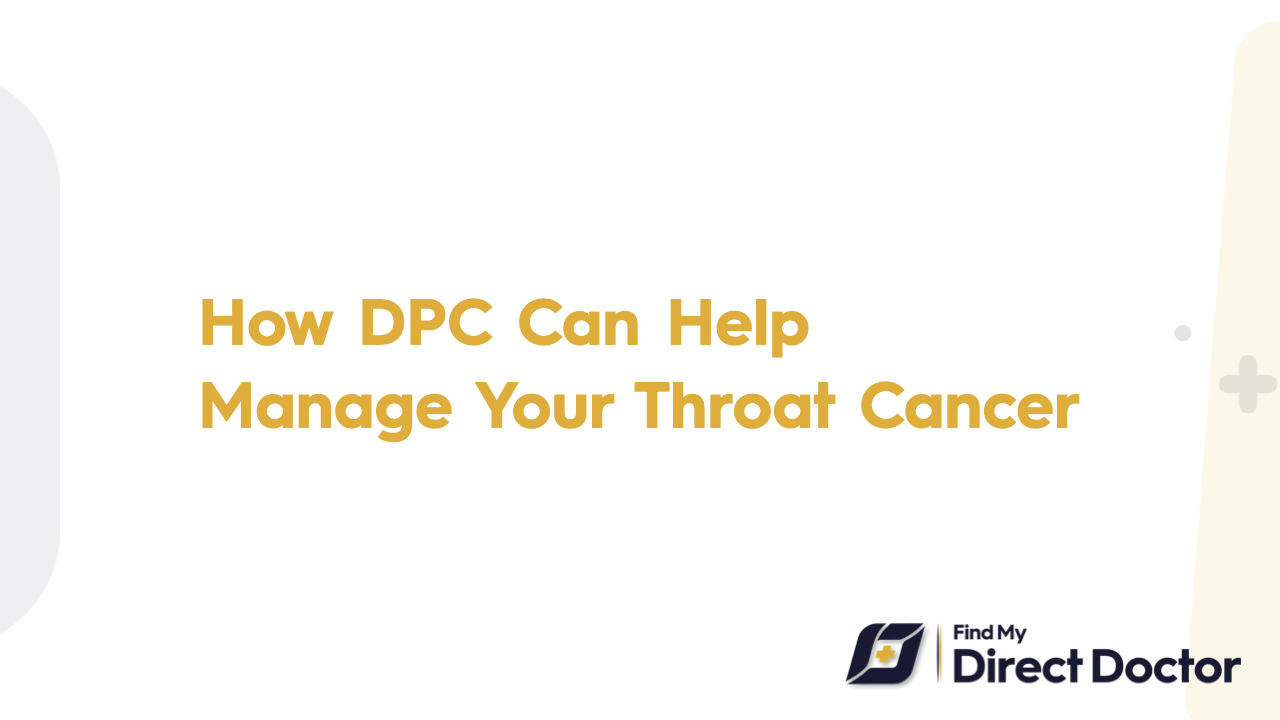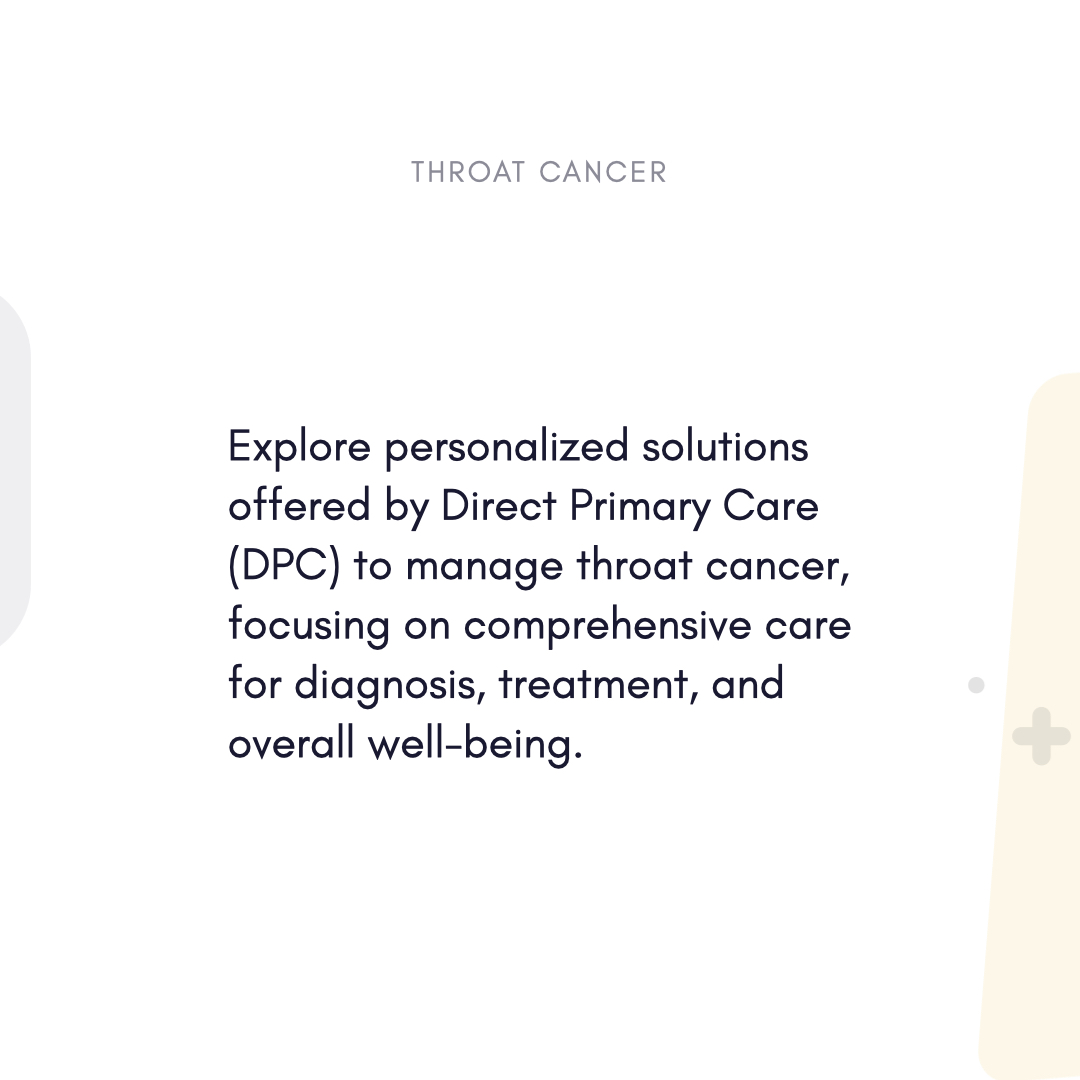Throat Cancer and Direct Primary Care (DPC): A Lifeline for Prevention, Treatment, and Survivorship
You know the great need for ongoing, compassionate treatment if you have ever battled a chronic sore throat, struggled to swallow, or faced the difficult road of throat cancer treatment. 53,000 Americans die from throat cancer every year; increasing numbers of cases are connected to HPV. Direct Primary Care (DPC), however, presents a patient-centered approach to throat cancer treatment combining early detection, cost transparency, and lifelong survivorship support.

Knowing Throat Cancer and Its Difficulties
Malignancies of the pharynx, larynx, and tonsils together comprise throat cancer. Major categories:
- Often in younger, non-smoking patients, HPV-related oropharyngeal cancer
- Linked to smoking/alcohol is squamous cell carcinoma.
- Recurrent/metastatic disease calls for complicated, continuous treatment.
Indices:
- Hoarseness extending more than two weeks.
- Ear pain or a sore throat on demand.
- Neck lump, trouble swallowing.
Long-term consequences of therapy:
- Dry tongue, radiation-related dental problems.
- Problems with speaking and swallowing.
- Higher risk of secondary tumors.
DPC Turns Around Management of Throat Cancer
Under the membership model known as Direct Primary Care (DPC), patients pay a monthly fee—usually 50 USD–150 USD—for unlimited access to their main care physician. For those with throat cancer, this means no surprise bills, no waiting months for specialist follow-ups, and treatment centered on your whole well-being.
Here's why DPC distinguishes itself:
1. Early Discovery by Vigilant Screening
DPC doctors follow American Cancer Society recommendations including:
- Advocacy for HPV vaccinations: Gardasil for adults at high risk and teenagers.
- Symptom triage: quick referrals for neck lumps or ongoing hoarseness.
- Lifestyle counseling: Reducing alcohol intake to lower risk, quitting smoking.
2. Reasonably priced, well-coordinated treatment
- By negotiating cash rates for diagnostics—e.g., 500 USD PET-CT instead of 5,000 USD+—DPC clinics help to lower costs.
- For bundled pricing, teaming with oncologists and ENT surgeons.
- Offering in-office supportive care (such as dietary shakes, speech therapy guides).
3. Support for Lifelong Survivorship
- Survivors can control xerostomia or radiation-induced hypothyroidism with 24/7 access to your DPC doctor.
- Address mental health issues (such as depression following laryngectomy).
- Using tumor markers and routine tests, track for recurrence.
DPC's advantages for throat cancer sufferers
Customised Screening & Prevention
- During each visit, DPC doctors dedicate 30 to 60 minutes developing plans including:
- Plans for the HPV vaccination: Adult catch-up doses up to 45 years old.
- Dental alliances: Low-cost fluoride treatments meant to stop radiation caries.
- For families with inherited cancer syndromes, genetic testing.
Financial Restraints
- No co-pays for regular visits during or following treatment.
- Immunotherapy infusions at rates pre-negotiated 30–50% less.
- Proactive symptom control helps to avoid ER visits.
Comprehensive Surviving Care
DPC handles:
- Diet: Create custom meal plans including soft, high-protein foods for dysphagia.
- Rehabilitation: Referrals to physical therapists and speech therapists.
- Palliative care addresses pain management and quality-of-life enhancement.
Actual Case Studies for Success
- Case 1: Thanks DPC's quick ENT referral, 52-year-old Mark discovered early-stage laryngeal cancer. Having laser surgery, he stayed away from chemotherapy and kept his voice.
- Case 2: Lisa, 38, an HPV+ survivor, controls persistent dry mouth with her DPC-prescribed pilocarpine, so saving 300 USD/month on medications.
Questions of FAQ: DPC and Cancer of the Throat
- Q: Can DPC manage advanced throat cancer?
- A: A DPC manages side effects and costs by working with oncologists on chemo/radiation.
- Q: Is DPC reasonably priced for monitoring following treatment?
- A: Absolutely. Members save forty to sixty percent on yearly imaging and specialist visits.
- Q: What should I do if I require a feeding tube?
- A: DPC doctors teach family caregivers and set up home health visits.
Why DPC Benefits Those With Throat Cancer
Survivorship care plans are stressed by the American Society of Clinical Oncology (ASCO). DPC offers this via:
- Centralizing documentation: perfect communication between oncologists and PCPs.
- Patient empowerment: Education on good living and recurrence signals.
- Streamlining expenses: One monthly cost pays for unlimited coordination of care.
Use DPC to reclaim your voice.
Throat cancer does not have to rob your future. Every screening, every treatment, every step toward survivorship—you get a partner who listens, advocates, and prioritizes your health with DPC.






